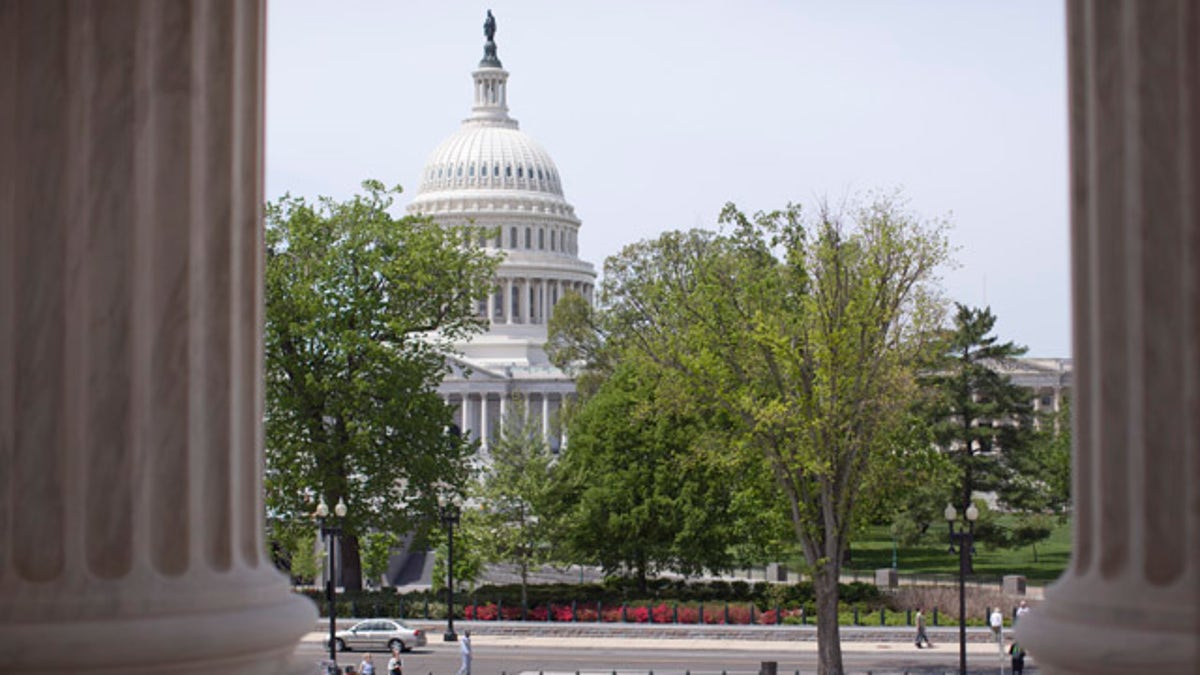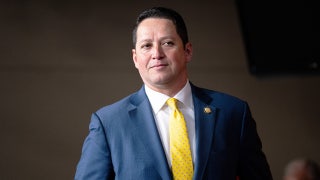
FILE - In this May 5, 2014, file photo, the U.S. Capitol building is seen through the columns on the steps of the Supreme Court in Washington. (AP Photo/Carolyn Kaster, File)
WASHINGTON – With an August deadline looming, the House is poised to act on a bill that would temporarily patch over a multibillion-dollar pothole in federal highway and transit programs while ducking the issue of how to put the programs on sound financial footing.
The bill by Ways and Means Committee Chairman Dave Camp, R-Mich., cobbles together $10.8 billion in pension tax changes, customs fees and money from a fund to repair leaking underground fuel storage tanks to keep the federal Highway Trust Fund solvent through May 2015. A similar bill is pending in the Senate.
Unless Congress acts, the Transportation Department says that by the first week in August the fund will no longer have enough money to cover promised aid to states, and the government will begin to stretch out payments. States have been told to expect a 28 percent reduction in aid on average. The fund is expected to reach a zero balance by the end of August. Some states already have begun to delay or cancel construction projects due to the uncertainty of federal money.
Since 2008, Congress has repeatedly dipped into the general treasury to shore up the trust fund because revenue from the federal 18.4 cent-a-gallon gasoline tax and the 24.4 cent-a-gallon diesel tax hasn't kept pace with promised aid to states. Federal fuel taxes haven't been raised in more than 20 years. About 20 percent of the trust fund's revenue goes to transit programs.
The White House expressed support for the GOP bill in a statement Monday, but also called for passage of a long-term solution to the transportation funding dilemma before the money in the bill runs out. In an effort to keep the pressure on Congress to act, President Barack Obama planned to visit a transportation research center in Virginia on Tuesday.
Democrats complain that it won't be any easier under the GOP bill to reach a compromise on sustainable, long-term means to pay for programs by pushing off a decision until next year when the presidential campaign is heating up. Republicans, however, may be in a better position to shape a transportation bill to their liking next year if they re-take control of the Senate in this fall's midterm elections.
Democrats plan to offer a motion that would reduce the money in the GOP bill to about $8 billion -- just enough to pay for highway and transit aid through Dec. 31 -- in the hope that another quick deadline would force Congress to come to an agreement on a long-term funding plan this year.
"When you take off the pressure that's forcing us to work, what incentive is there to take on the hard questions?" said Rep. Earl Blumenauer, D-Ore.
What makes the issue so difficult for Congress is that there is no politically palatable funding solution. The most obvious answer would be to raise fuel taxes. That's what several blue-ribbon commissions created by Congress have recommended. But backing fuel tax increases helped President George H.W. Bush lose his re-election bid in 1992, and Democrats lose the House and Senate in 1994. Also, cars are becoming more fuel-efficient and people are driving less per capita, trends that are eroding the ability of fuel taxes to provide enough revenue for programs.
Republican lawmakers are divided over transportation policy. A significant minority of the party's more conservative House members want to slash federal gas and diesel taxes, dramatically scale back transportation aid and leave it to states to come up with the money to pay for roads, bridges, buses and trains.
As a sop to conservatives, the House Rules Committee added an amendment by Rep. Tom Graves, R-Ga., to the bill that says Congress should "increase the authority and responsibility of the states" to fund and manage their transportation systems.











































